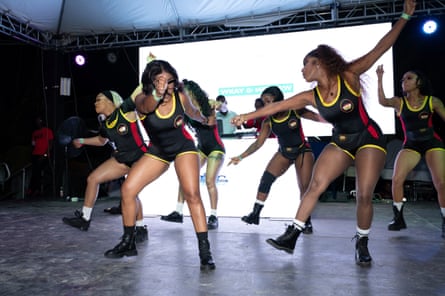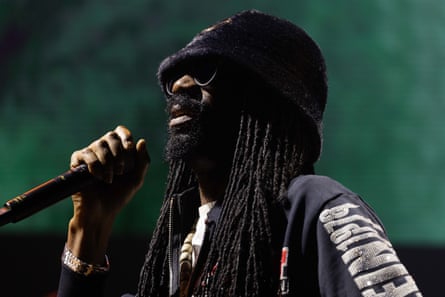Four days after the attempt on his life, the voice of Donald Trump booms from the speakers in Montego Bay, Jamaica: “If they needed an assassin, they should have sent for Bodyguard … about to commit a quadruple murder at Sumfest in Montego Bay.” The audience are taken by surprise, having been primed for a reggae riddim to drop, and laugh.
The Bodyguard crew have just taken to the stage at Sumfest Global Sound Clash, a musical gladiatorial contest where sound systems battle against one another with creative mixing, hyped-up MCs and exclusive – often incendiary – recordings featuring star guests and in-jokes. AI vocalists such as this fake Trump, however, are sending shockwaves through a decades-old musical tradition in which authenticity and originality are paramount, and sound systems pay premium rates to artists to get vocals for clashes.
“AI is going to mash up the industry,” says Fabian Anderson, a dub agent who liaises between artists and sound systems to secure those exclusive tracks. He’s refused to touch the technology, but knows studios that are dabbling in it, to the point where he is now sending his clients videos of artists’ recording sessions to verify their legitimacy.
Clashes emerged from Jamaica’s music scene in the 1950s, when selectors imported records from the US and played them to crowds via customised mobile sound systems. “Jamaica became the loudest island on Earth, with ever-larger crowds gathering for showcases,” Island Records founder Chris Blackwell wrote in his 2022 memoir. As more sound systems cropped up on the scene, they had to battle for the crowd’s attention: “Who had the best tunes? Who had the loudest, toughest sound?”

To prepare for a clash, sound systems work with artists to record exclusive dubplates, often covers in an aggressive dub style with lyrics rewritten for battle scenarios. One famous example is the Fugees’ rework of Roberta Flack’s Killing Me Softly, originally written by the group as a battle dubplate with the lyrics “killing a soundboy with his sound”. Commissioning an artist to appear on one of these tracks costs between $150 and $800, says Anderson, and the most exclusive dubplates can reach up to thousands of dollars: Super Cat and Shabba Ranks are among the most coveted artists.
To joyfully blaring vuvuzelas in the Sumfest crowd, German sound system Warrior Sound drop an exclusive dub recorded by Jamaican upstart Nigy Boy, with the lyrics to his viral hit Continent changed with shout-outs to Warrior: “Sumfest / we’ll kill dem / we will win da trophy.” Other artists heard in the clash include Bounty Killer, Damian Marley, Capleton, Beres Hammond and the Heptones.
Most selectors only use seconds of a dub “to get the point across,” says Anderson. Songs cannot be repeated, so a host of dubplates are required to ensure momentum. It’s a costly process, which has led to a commonplace practice of splicing – copying dubplates and erasing the original sound system name drops – to get tracks cheap. With the arrival of generative AI, the game is getting dirtier still. “AI is even worse [than splicing],” says Anderson.
Veteran UK reggae/dancehall vocalist Paul Scott Levy – AKA General Levy – records dubs “nearly every week”. He trusts that established sound systems will uphold the rules of the clash. “It’s not just using a voice. It’s about how you got the voice, the relationship, how much money you paid for it.”
Levy cites the recent Kendrick Lamar/Drake rap battle as an example of a generative AI flop: when Drake released Taylor Made Freestyle, a track with AI versions of 2Pac and Snoop Dogg dissing Lamar, “Drake got slewed for that. It didn’t give [AI] any merits in the clashing arena.” The Tupac estate threatened legal action against Drake and the track has since been taken down from all music platforms.

Sound systems play their cards close to their chest – Notorious employed a “top secret” artist to record a dub cover of Bob Marley’s Buffalo Solider (with lyrics changed to “Japanese Soldier”) – yet stress they would never use AI to bring Marley back from the dead, or deepfake any living artist. “It’s to respect the artist. If people want to do it, do it, I’m going to find out and cuss them,” smiles Notorious’s selector, Bad Gyal Marie.
Fellow contender Dynamq, who was Sumfest champion in 2023, has a more ambivalent view. “Splicing, AI – I don’t think [the crowd] give a damn or care about it,” he said. “As long as it sounds good, people will run with it. I’m not supporting it; I’d rather lose with integrity than win.”
At Sumfest, the vuvuzelas sound the loudest for Jamaican-Japanese sound system Notorious International, who claim the grand prize of a million Jamaican dollars (around $6,300). Bodyguard ultimately finish second after a blazing “tune-fi-tune” showdown with Notorious. Bodyguard founder Courtney Singh, a sound clash veteran active in the scene since the early 90s, says he draws the line at AI use beyond parody skits like the Trump dub. “It is a real danger – I’m not sure how it will be controlled,” he says. “There’s an unspoken code of ethics, but [now] there’s a different generation that’s just about a win at all costs.”
Singh points out that new-gen sound systems may rely on AI to break into the scene, due to the expensive rates charged by many artists, who often sell to wealthier sound systems in Japan and Europe. “In Jamaica, we are paying US dollars for our dubplates! Artists are charging 10, twentyfold as much than when I started, which is almost making it prohibitive,” he says. “They are playing a big part in their own demise.”
Perhaps inevitably, Levy disagrees. “AI will be used to infiltrate a once pure genre of dancehall and reggae, taking away the true vibe,” he says, defending his flesh and blood vocals. “Our voice is our bread and butter.”
Source: theguardian.com

















